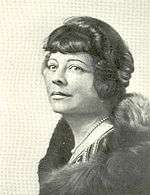Sarah Wambaugh

Sarah Wambaugh (March 6, 1882 – November 12, 1955) was an American political scientist. She was born in Cincinnati, Ohio, the daughter of legal scholar Eugene Wambaugh. She earned an A.B. in 1902 and an A.M. in 1917 from Radcliffe College, in Cambridge, Massachusetts, where she also later taught. She also carried out studies in England; in London and Oxford.
Wambaugh eventually became recognised as the world's leading authority on plebiscites.[1] She was an advisor to the Peruvian government for the Tacna-Arica Plebiscite (1925–26), to the Saar Plebiscite Commission (1934–35), to the American observers of the Greek national elections (1945–46) and to the U.N. Plebiscite Commission to Jammu and Kashmir (1949). During World War II she was a consultant to the director of the enemy branch of the Foreign Economic Administration.[2] She was elected a Fellow of the American Academy of Arts and Sciences in 1944.[3] She died in Cambridge, Massachusetts on November 12, 1955.
Select publications
- A Monograph on Plebiscites: With a Collection of Official Documents, Oxford University Press (1920)
- Plebiscites Since the World War: With a Collection of Official Documents, University of California (1933)
- The Saar Plebiscite: With a Collection of Official Documents, Harvard University Press (1940)
References
- ↑ "Saar Umpires". TIME. 1934-05-14. Retrieved 2008-01-31.
- ↑ "Wambaugh, Sarah, 1882-1956. Papers, 1902-1949: A Finding Aid". Harvard University Library. August 2005. Retrieved 2008-01-31.
- ↑ "Book of Members, 1780–2010: Chapter W" (PDF). American Academy of Arts and Sciences. Retrieved July 29, 2014.
External links
- Sarah Wambaugh Papers. Schlesinger Library, Radcliffe Institute, Harvard University